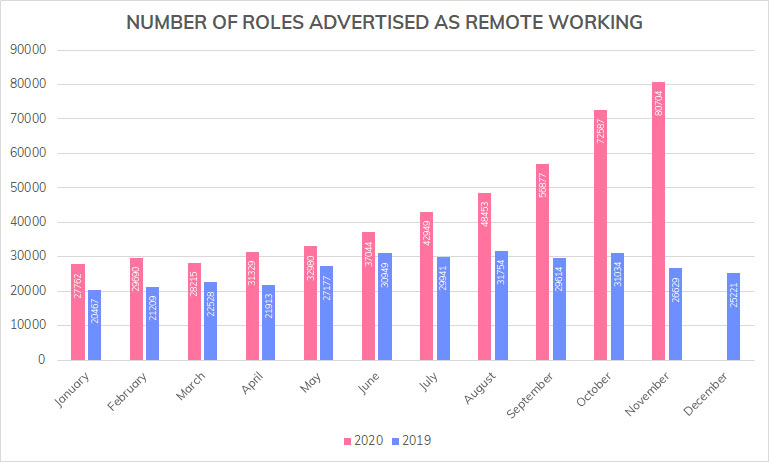With the ongoing pandemic causing widespread lockdowns and forcing many office workers to abandon city centres to work from home, new research conducted by our talent strategy consulting team has shown that the number of remote working roles advertised within the UK has trebled from 26,600 to 80,700 in the past year.*

This rise in the number of remote roles is a sign that a major change is underway in how Britain works, as some businesses experiment with cutting office space to reduce overheads and allow some staff the option to work from home longer term.
Whilst highly-paid leadership roles are often assumed to have some flexible working allowance ‘built-in’, the figures suggest that many businesses are more likely to have junior staff working remotely than management teams, with 70% of roles advertised as being remote earn less than £50k per year. Surprisingly, only 3% of remote roles are advertised at more than £100k per year.
Businesses are now deciding how many of their staff they are going to bring back into the office once this crisis is finally over, and how many can stay remote.
Most businesses take the view that staff and tasks are better off in an office environment where close team working, collaboration and mentoring can more easily take place, however we are certainly going to see a more hybrid workforce with working from home an option for at lease some of their staff.
Feedback we get is that many staff have missed interacting with their colleagues, that the experience of working from home has been isolating. Not everyone has a space that they can easily work from. Employers who want to get this decision right will need to look at the issues closely.
There has been a trend in recent years to invest more in the workplace – to make it somewhere where staff would want to spend time. It will be quite a revolution if that trend doesn’t eventually reassert itself.
Businesses across a whole gamut of industries, including Facebook, Hitachi, French car manufacturer PSA and IT consultancy Infosys are all among the businesses that have announced that some of their staff will be able to work from home permanently, even after the COVID-19 pandemic is over.
Natalie Douglass is a director in our talent intelligence team. If your business is grappling with the challenges that a more permanent shift to remote working will bring, or is looking to implement the right hybrid model that will bring benefits for your business and your employees, we can help. Get in touch.
*Source: EMSI
